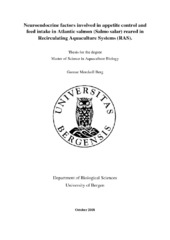| dc.contributor.author | Berg, Gunnar Merckoll | |
| dc.date.accessioned | 2018-11-23T15:07:31Z | |
| dc.date.available | 2018-11-23T15:07:31Z | |
| dc.date.issued | 2018-11-15 | |
| dc.date.submitted | 2018-11-14T23:00:04Z | |
| dc.identifier.uri | https://hdl.handle.net/1956/18734 | |
| dc.description.abstract | The control of appetite in vertebrates is a complex process that depends on a range of signals from peripheral tissues and neuro- and endocrine signals originating in the brain. The hypothalamus is believed to be the main site for signal integration and control of appetite and feed intake. Previous studies on involvement of neuropeptides in appetite regulation in Atlantic salmon (Salmo salar) has been based on analysis of whole brain. No studies have involved dissection of the brain to quantify the spatial and temporal expression of the neuropeptides involved in appetite regulation in different parts of the brain. Neuropeptide Y (NPY), cocaine- amphetamine related transcript (CART), agouti-related protein 1 (AgRP-1) and proopiomelanocortin- a2s (POMCa2s) are neuropeptides believed to be involved in appetite regulation in Atlantic salmon. In the present study the mRNA concentration of these neuropeptides was assessed by qPCR in 6 parts of the brain. There was a significantly higher mRNA concentration of NPY in the forebrain compared to all the other tissues of the brain. POMCa2s showed a significant higher mRNA concentration in the pituitary than in all other parts of the brain. CART had a significantly higher expression in the forebrain than in cerebellum and pituitary while AgRP-1 showed no significant differences in mRNA concentration among the different brain tissues. As part of this study the fish went through a vaccination period that involved fasting, and the only significant differences found were in the forebrain for POMCa2s and in the midbrain for NPY. The extensive expression of neuropeptides involved in appetite control in different parts of the brain suggest other roles than appetite control for these neuropeptides, and/or the appetite control is being supplemented from other parts of the brain than the hypothalamus. This study shows that further research on the involvement of the neuropeptides in control of appetite cannot be based on analysis of whole brain and needs to focus on specific regions and signaling pathways. | en_US |
| dc.language.iso | eng | eng |
| dc.publisher | The University of Bergen | en_US |
| dc.subject | Atlanterhavslaks | nob |
| dc.subject | Appetitt | nob |
| dc.subject | Nevroendokrinologi | nob |
| dc.subject | Nevropeptider | nob |
| dc.subject | Fiskefysiologi | nob |
| dc.title | Neuroendocrine factors involved in appetite control and feed intake in Atlantic salmon (Salmo salar) reared in Recirculating Aquaculture Systems (RAS). | en_US |
| dc.type | Master thesis | |
| dc.date.updated | 2018-11-14T23:00:04Z | |
| dc.rights.holder | Copyright the Author. All rights reserved | en_US |
| dc.description.degree | Masteroppgave i biologi | en_US |
| dc.description.localcode | MAMN-BIO | |
| dc.description.localcode | BIO399 | |
| dc.subject.realfagstermer | https://data.ub.uio.no/realfagstermer/c012698 | |
| dc.subject.realfagstermer | https://data.ub.uio.no/realfagstermer/c011021 | |
| dc.subject.realfagstermer | https://data.ub.uio.no/realfagstermer/c007901 | |
| dc.subject.realfagstermer | https://data.ub.uio.no/realfagstermer/c005750 | |
| dc.subject.realfagstermer | https://data.ub.uio.no/realfagstermer/c004057 | |
| dc.subject.nus | 751999 | eng |
| fs.subjectcode | BIO399 | |
| fs.unitcode | 12-60-0 | |
